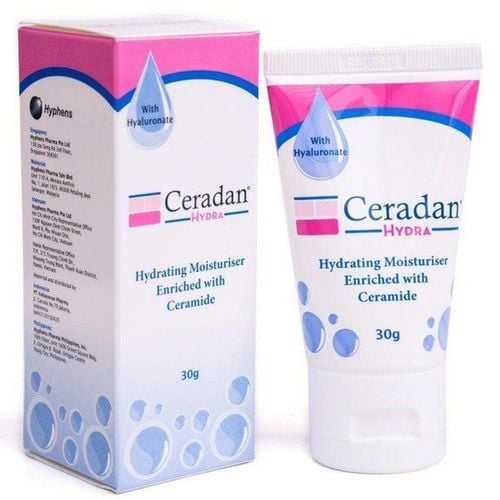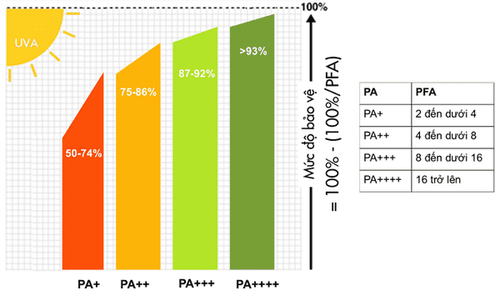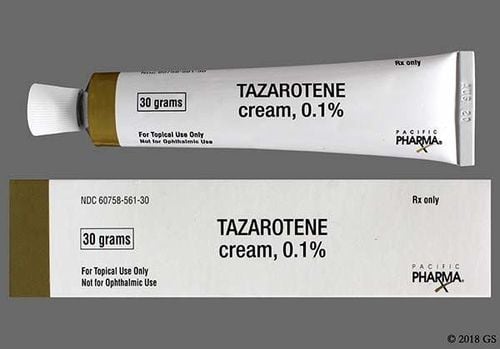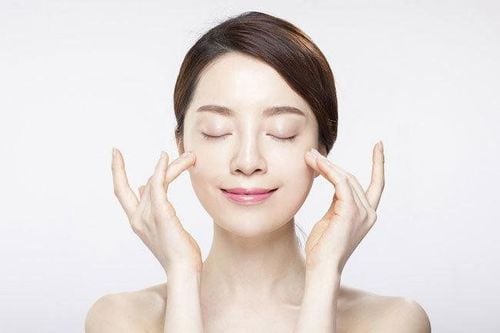This is an automatically translated article.
Titanium dioxide is an inert mineral used in sunscreens and cosmetics to whiten, lubricate, and protect the skin thanks to its ability to be similar to zinc oxide sunscreens. Furthermore, the Titanium dioxide ingredient in sunscreens can provide gentle coverage for those with acne-prone or reddened skin.
1. What effect does titanium dioxide have?
In nature, titanium is a metal in the earth's crust. However, titanium often combines with oxygen to produce various oxides that are available in native dust, sand, and soil. In it, pure Titanium dioxide has a fine and white powder form. As a compound, Titanium dioxide is chemically inert. Simply put, unless subjected to any critical conditions, Titanium dioxide will not react and change its chemical composition.
Like zinc oxide, titanium dioxide has been used in medicines, foods, and sunscreens. However, unlike Zinc, the use of Titanium dioxide was not widespread until the early 20th century. Today, this natural mineral is widely used in sunscreens and cosmetics for whitening, thickening, topical application. smooth, while providing skin protection against the sun with the following advantages:
Not visible to the naked eye: Titanium dioxide usually shrinks much more, from 10 to 100 nanometers, making the This part is less noticeable on the skin. This has become a good choice of sunscreen for dark skin, as will not leave an opaque layer on the skin. No risk of acne and gentle effects on the skin: Similar to zinc oxide, Titanium dioxide is inert, so it is also hypoallergenic. This ingredient is also extremely gentle, making products containing Titanium dioxide a great choice for those with sensitive skin. Sun protection: Although it does not provide much protection from long-wave UVA rays, Titanium dioxide is extremely effective in blocking short-wave UVA and UVB rays, helping to prevent skin aging. daily exposure to the sun.
2. How does titanium dioxide in sunscreen work?
Titanium dioxide is a sunscreen with a similar function to zinc oxide. The molecules of titanium dioxide are not absorbed into the skin, so they stay on the surface. The bright surface of the mineral reflects UV rays away from the body. Since the rays never reach, the skin is protected.
When used in sunscreens, Titanium dioxide is usually ground into small particles. This increases the skin's ability to protect against UVB rays. This small particle size also makes the ingredient less noticeable on the skin, making it ideal for those with darker skin tones.
However, reducing the particle size of Titanium dioxide in sunscreens also reduces effectiveness against UVA rays, rays that cause premature skin aging and wrinkles. Therefore, Titanium dioxide in sunscreen in particular or Titanium dioxide in cosmetics in general is almost always used in conjunction with zinc oxide, which protects against both UVA and UVB rays.
3. Why should you use sunscreen containing Titanium dioxide?
Some chemical sunscreens only protect the skin from long-wave UVB rays, the rays that cause sunburn. These sunscreens expose the skin to UVA rays that cause skin aging. At this point, when used, the Titanium dioxide in the sunscreen will block most of the UVA rays before they reach the skin. Some sunscreens that contain Titanium dioxide also contain zinc oxide at the same time to provide protection from UVA and UVB rays.
In fact, dermatologists recommend sunscreens made with Titanium dioxide because they are less irritating to the skin than sunscreens made with chemically active ingredients. In 2018, Hawaii passed a bill banning the sale and use of chemical sunscreens containing oxybenzone and octinoxate because research shows they can contribute to the negative effects of coral bleaching that can lead to death of coral reefs. Coral reef. At this time, Titanium dioxide and zinc oxide are natural, safe and effective alternatives to chemical sunscreen ingredients.
4. Risk of long-term exposure to Titanium dioxide in cosmetics
Sunscreen products are intended for daily and long-term use, and therefore need to be thoroughly examined for possible short- and long-term health effects. This includes toxicity testing for potential skin irritation and allergy, as well as testing for absorption, potential for skin cancer, disrupting hormone systems, reproductive harm, and develop.
Accordingly, Titanium dioxide in cosmetics in general and Titanium dioxide in sunscreens in particular are often in the form of nanoparticles. This ingredient has been classified as safe and effective by the FDA. Evidence shows that very few titanium particles can penetrate through the skin to reach living tissues and cause harm to the organism.
However, Titanium dioxide is classified as a probable human carcinogen by the International Agency for Research on Cancer because of the potential for prolonged inhalation exposure. For this reason, powder or spray preparations containing Titanium dioxide are of concern.
Overall, though, physical sunscreens tend to outperform chemical sunscreens in sunscreen databases. It is important that manufacturers use mineral forms coated with inert chemicals to reduce photoactivity, in order to minimize risk to long-term sunscreen users while maximizing sun protection. of these products.
In addition, to limit the possible risks of Titanium dioxide exposure in cosmetics, experts always recommend that users avoid using powders and blushes containing titanium. Powdered cosmetics, too, need to be handled with care. At the same time, for Titanium dioxide in sunscreen, it is better not to use a spray sunscreen but to use a topical one because it is possible to accidentally inhale some of the fine particles in the air.
Lip balm is also a potential source of Titanium dioxide in nano-cosmetic cosmetics. As a result, the user will be able to ingest one of them and the particles will reach the internal system of the body. However, most experiments have shown that such oral exposure does not pose much of a risk, as oral penetration of titanium particles is very limited.
Conclusion, Titanium dioxide in sunscreen is likened to an optimal and durable sunscreen filter in the sun, protecting the skin from the harmful effects of both rays with the highest protection level UVA and UVB. Furthermore, unlike organic compounds, Titanium dioxide is chemically inert, reducing the likelihood of toxicity and allergic reactions to the skin. These are the reasons that recommend users to choose sunscreen containing Titanium dioxide. In addition, users also need to pay attention to use light cream products instead of sprays, which are smooth and stick on the skin for a long time. At the same time, some products also have soft skin care features and help lift skin tones, do not cause oil shine, do not dissolve in water, prevent skin aging, melasma, brown spots on the skin, ensuring effective results. Maintain smooth, healthy skin all day long.
Please dial HOTLINE for more information or register for an appointment HERE. Download MyVinmec app to make appointments faster and to manage your bookings easily.













